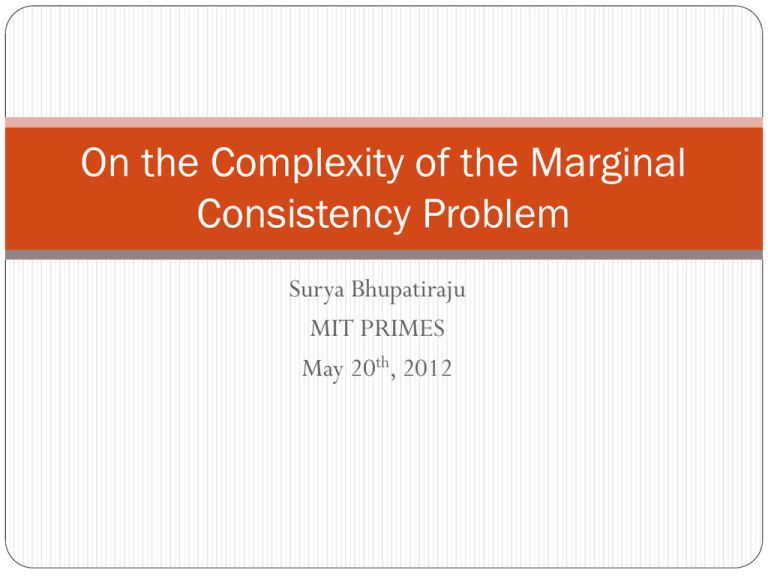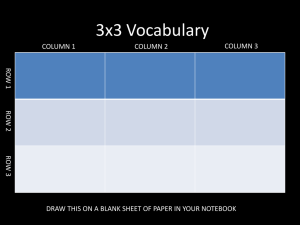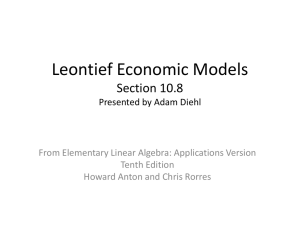0 - MIT
advertisement

On the Complexity of the Marginal Consistency Problem Surya Bhupatiraju MIT PRIMES May 20th, 2012 Marginal Constraint Problems Suppose we have constraints on the sums of entries in a 3 3 grid: Entries must be nonnegative. 3 5 8 2 6 8 Marginal Constraint Problems Suppose we have constraints on the sums of entries in a 3 3 grid: Entries must be nonnegative. 3 5 8 2 =3 6 8 Marginal Constraint Problems Suppose we have constraints on the sums of entries in a 3 3 grid: Entries must be nonnegative. 3 5 8 2 =3 6 8 =6 Marginal Constraint Problems Suppose we have constraints on the sums of entries in a 3 3 grid: Entries must be nonnegative. marginals 3 5 8 2 =3 6 8 marginals =6 Marginal Constraint Problems Suppose we have constraints on the sums of entries in a 3 3 grid: Entries must be nonnegative. marginals =3 3 5 8 2 0 0 2 1 5 0 6 0 0 8 8 marginals =6 Marginal Constraint Problems Suppose we have constraints on the sums of entries in a 3 3 grid: Entries must be nonnegative. marginals =3 3 5 8 1 0.5 0.5 2 1 0.5 3.5 6 1 4 4 8 marginals =6 Marginal Constraint Problems Suppose we have constraints on the sums of entries in a 3 3 grid: Entries must be nonnegative. 3 5 8 1 0.5 0.5 2 1 0.5 3.5 6 1 4 4 8 For these marginal constraints, there exists a tableau that satisfies them. If a solution exist, the constraint problem is satisfiable. Question: Given constraints, how hard is it to check if a solution exists and to find one if it does? A Probabilistic Example 0.5 (X,Y, Z) 0 0.5 0.5 0 Z=1 0 0.5 0 0 Z=0 0.5 0 0.5 Y=1 Y=0 X=0 XY-marginals Pr[(0, 0, ?)] = 0.5 Pr[(0, 1, ?)] = 0 Pr[(1, 0, ?)] = 0 Pr[(1, 1, ?)] = 0.5 X=1 YZ-marginals Pr[(?, 0, 0)] = 0.5 Pr[(?, 1, 0)] = 0 Pr[(?, 0, 1)] = 0 Pr[(?, 1, 1)] = 0.5 XZ-marginals Pr[(0, ?, 0)] = 0.5 Pr[(1, ?, 0)] = 0 Pr[(0, ?, 1)] = 0 Pr[(1, ?, 1)] = 0.5 A Probabilistic Example 0.5 (X,Y, Z) 0 0.5 0.5 0 Z=1 0 0.5 0 0 Z=0 0.5 0 0.5 Y=1 Y=0 X=0 XY-marginals Pr[(0, 0, ?)] = 0.5 Pr[(0, 1, ?)] = 0 Pr[(1, 0, ?)] = 0 Pr[(1, 1, ?)] = 0.5 X=1 YZ-marginals Pr[(?, 0, 0)] = 0.5 Pr[(?, 1, 0)] = 0 Pr[(?, 0, 1)] = 0 Pr[(?, 1, 1)] = 0.5 XZ-marginals Pr[(0, ?, 0)] = 0.5 Pr[(1, ?, 0)] = 0 Pr[(0, ?, 1)] = 0 Pr[(1, ?, 1)] = 0.5 A Probabilistic Example 0.5 (X,Y, Z) 0 0.5 0.5 0 Z=1 0 0.5 0 0 Z=0 0.5 0 0.5 Y=1 Y=0 X=0 XY-marginals Pr[(0, 0, ?)] = 0.5 Pr[(0, 1, ?)] = 0 Pr[(1, 0, ?)] = 0 Pr[(1, 1, ?)] = 0.5 X=1 YZ-marginals Pr[(?, 0, 0)] = 0.5 Pr[(?, 1, 0)] = 0 Pr[(?, 0, 1)] = 0 Pr[(?, 1, 1)] = 0.5 XZ-marginals Pr[(0, ?, 0)] = 0.5 Pr[(1, ?, 0)] = 0 Pr[(0, ?, 1)] = 0 Pr[(1, ?, 1)] = 0.5 A Probabilistic Example 0.5 (X,Y, Z) 0 0.5 0.5 0 Z=1 0 0.5 0 0 Z=0 0.5 0 0.5 Y=1 Y=0 X=0 XY-marginals Pr[(0, 0, ?)] = 0.5 Pr[(0, 1, ?)] = 0 Pr[(1, 0, ?)] = 0 Pr[(1, 1, ?)] = 0.5 X=1 YZ-marginals Pr[(?, 0, 0)] = 0.5 Pr[(?, 1, 0)] = 0 Pr[(?, 0, 1)] = 0 Pr[(?, 1, 1)] = 0.5 XZ-marginals Pr[(0, ?, 0)] = 0.5 Pr[(1, ?, 0)] = 0 Pr[(0, ?, 1)] = 0 Pr[(1, ?, 1)] = 0.5 Marginal Satisfiability Problem (MSP) Given desired marginal distributions DS for every subset S of c variable indices from [1…n], does there exist a distribution D over n-tuples of values in [1…m] with those S-marginals DS? Questions to Ask How hard is it to algorithmically solve the marginal satisfiability problem? Are there efficient algorithms to: Check that an assignment is valid? Predict whether solutions exist? Give an explicit satisfying assignment? Introduction to Complexity Theory Complexity theory: A field that tries to classify the hardness of computational problems. Complexity classes: NP-hard Harder NP-complete NP P Past Work [Loera, et al. 2002]: The MSP with 3 dimensions, (A B C) is NP- complete, even when the tableaus are slim, i.e. A = 3. Table counting and uniqueness are also hard. [Liu 2006]: MSP is NP-hard. The quantum variant of this problem is known to be QMA-complete, the quantum analog of NP-complete. [Gusfield 1988]: Studies table uniqueness when some of the entries are given. Bounds on Computation Past results are based on fixed dimensions only. We can vary these parameters: (n dimensions, m variables, c-variable marginals, entries precise to 1/K) Explicit Formulas Asymptotic growth # entries in tableau # potential tableaus # constraint equations # bits to describe tableau # steps to verify tableau When c is small, we can write down all the constraint equations. Varying dimension makes it hard to even write down a solution – not obviously in NP. 2D Solution Theorem: A 2D constraint problem is satisfiable if and only if the sum of the row and column marginal sums are equal. 3 5 8 2 2 0 0 6 1 4 1 8 0 1 7 3 + 5 + 8 = 16 2 + 6 + 8 = 16 Proof: (Only If): Easy – Add up entries in both directions. (If): Show construction is always possible. Fractional Construction 31 4 5 6 7 9 6 6 6 6 7 Fractional Construction: Multiply by row and column sum and divide by total sum Fractional Construction 31 4 6 24/31 6 24/31 6 24/31 6 24/31 7 28/31 5 6 7 9 Fractional Construction: Multiply by row and column sum and divide by total sum Fractional Construction 31 4 5 6 24/31 30/31 6 24/31 30/31 6 24/31 30/31 6 24/31 30/31 7 28/31 35/31 6 7 9 Fractional Construction: Multiply by row and column sum and divide by total sum Fractional Construction 31 4 5 6 7 9 6 24/31 30/31 36/31 42/31 54/31 6 24/31 30/31 36/31 42/31 54/31 6 24/31 30/31 36/31 42/31 54/31 6 24/31 30/31 36/31 42/31 54/31 7 28/31 35/31 42/31 49/31 63/31 Fractional Construction: Multiply by row and column sum and divide by total sum Sorted Construction 31 4 5 6 7 9 6 6 6 6 7 Sorted Construction: Assign entry to lower of row or column sum, recurse. Sorted Construction 27 40 62 4 5 6 7 9 6 6 6 7 Sorted Construction: Assign entry to lower of row or column sum, recurse. Sorted Construction 25 40 620 4 53 6 7 9 2 6 6 6 7 Sorted Construction: Assign entry to lower of row or column sum, recurse. Sorted Construction 22 40 530 6 620 4 2 63 3 7 9 6 6 7 Sorted Construction: Assign entry to lower of row or column sum, recurse. Sorted Construction 19 40 530 63 620 4 2 30 3 7 9 3 6 6 7 Sorted Construction: Assign entry to lower of row or column sum, recurse. Sorted Construction 16 40 530 30 620 4 2 30 3 63 7 9 3 3 6 7 Sorted Construction: Assign entry to lower of row or column sum, recurse. Sorted Construction 0 40 530 30 620 4 2 30 3 630 620 70 740 970 3 3 3 4 2 7 Sorted Construction: Assign entry to lower of row or column sum, recurse. Sorted Construction 31 4 5 6 7 9 6 4 2 0 0 0 6 0 3 3 0 0 6 0 0 3 3 0 6 0 0 0 4 2 7 0 0 0 0 7 Sorted Construction: Assign entry to lower of row or column sum, recurse. Local Consistency V(0, 0, +) = a V(0, 1, +) = b V(1, 0, +) = c V(1, 1, +) = d V(0, +, 0) = e V(0, +, 1) = f V(1, +, 0) = g V(1, +, 1) = h e a c V(+, 0, 0) = i V(+, 0, 1) = j V(+, 1, 0) = k V(+, 1, 1) = l g f h b d k i j l Local Consistency V(0, 0, +) = a V(0, 1, +) = b V(1, 0, +) = c V(1, 1, +) = d a+bi+k unsatisfiable V(0, +, 0) = e V(0, +, 1) = f V(1, +, 0) = g V(1, +, 1) = h e a c V(+, 0, 0) = i V(+, 0, 1) = j V(+, 1, 0) = k V(+, 1, 1) = l g f h b d k i j l Local Consistency A marginal constraint on a subset S induces marginal constraints on subsets S’ S. Two marginal constraints over two subsets S1 and S2 are locally consistent if they induce the same constraints on S1 S2. Theorem: If a constraint problem is satisfiable, then each pair of marginal constraints is locally consistent, but local consistency does not imply global satisfiability. Z-marginal: a+b=i+k e Z=1 a g f h b YZ-marginals: a, b XZ-marginals: i, k Z=0 c X=0 d X=1 k i j l Y=1 Y=0 Future Steps Extend Sorted Construction to 3D and higher. Pinpoint complexity of higher-dimensional cases. General constraints problem: Does the problem become harder if constraints may omit some sums? Integral conjecture: Does a satisfiable constraint problem with integer constraints always have an integral solution? Closing Thanks to Alex Arkhipov for proposal of the problem, and for excellent mentorship throughout the progress. Thanks to Tanya Khovanova for suggestions and edits with the presentation. Much thanks to MIT PRIMES for providing this opportunity for research! Thank you for attending!







